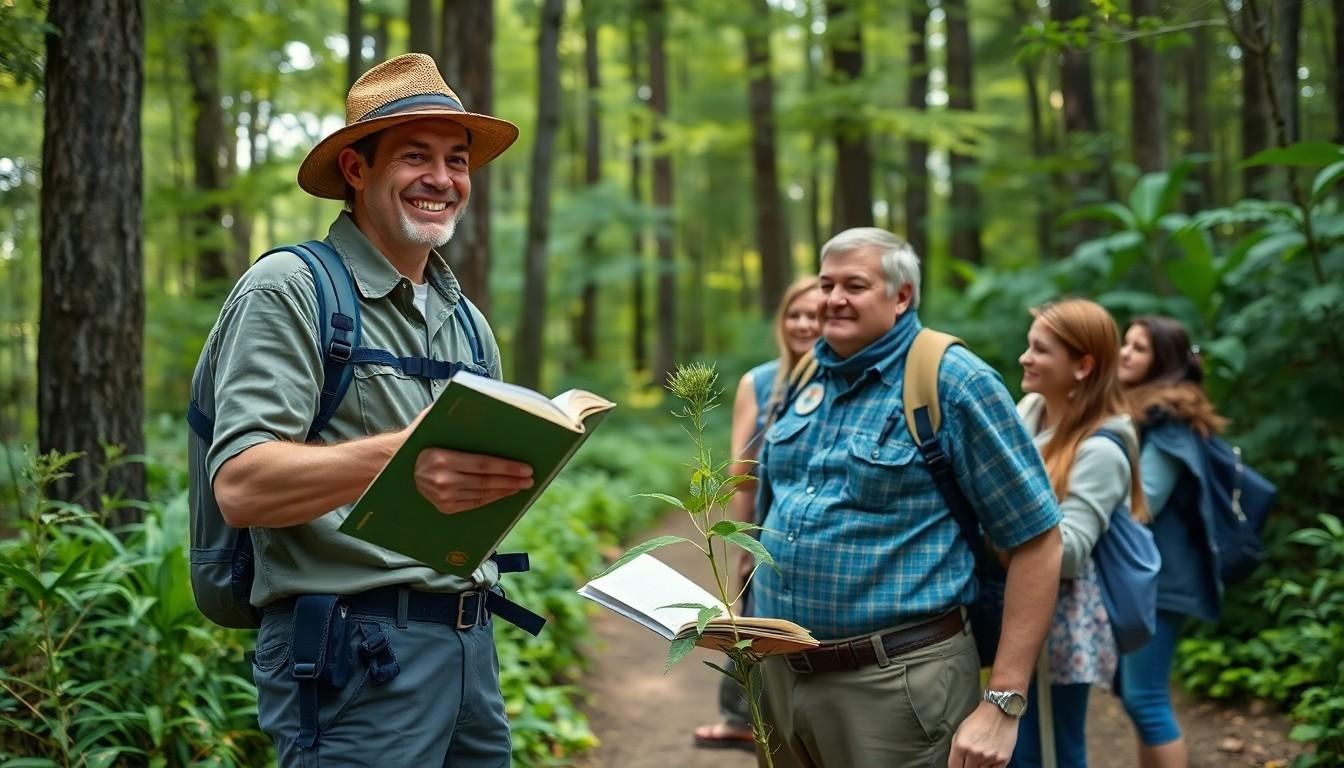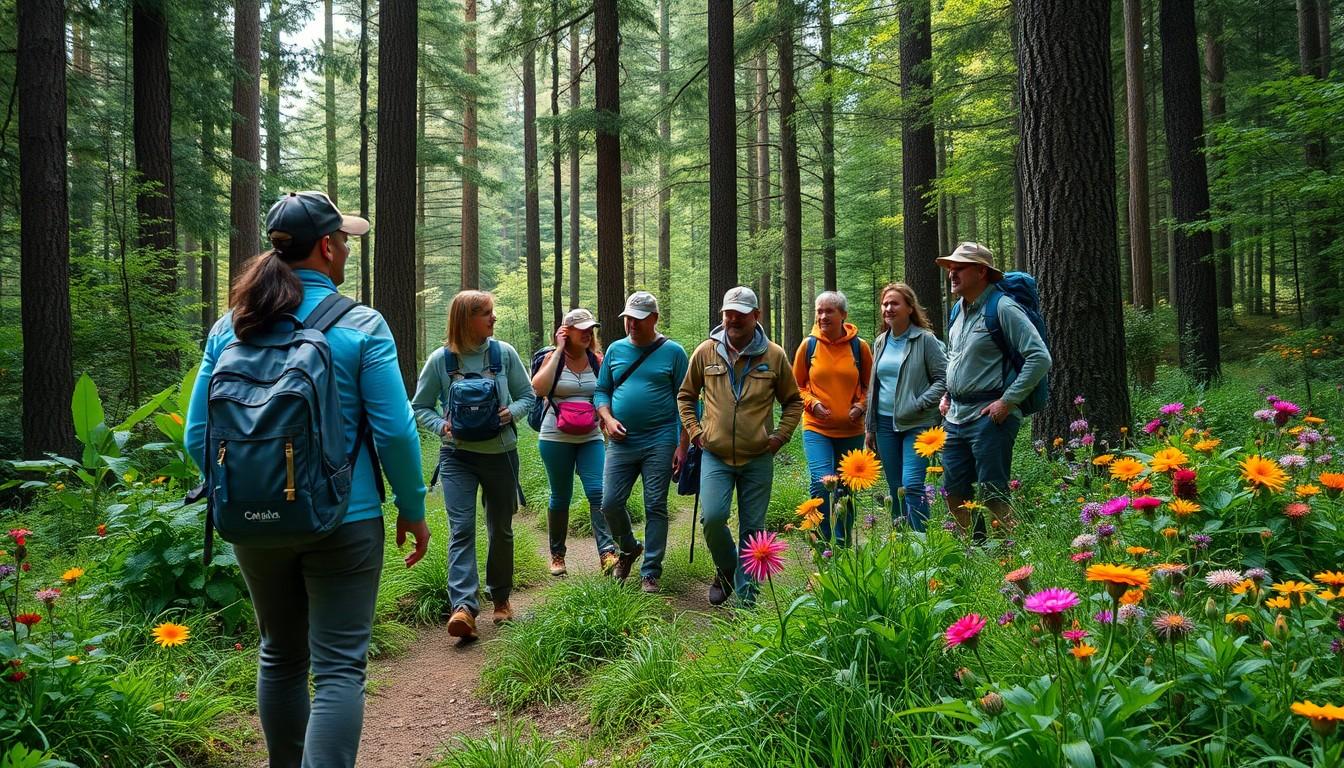
Eco Tourism Jobs: Turn Your Passion for Nature into a Rewarding Career Today
In a world where the call of the wild is louder than the office printer, eco-tourism jobs are the ultimate adventure. Imagine trading in that stuffy cubicle for a lush rainforest or a serene beach, all while saving the planet. It’s not just a job; it’s a chance to become a superhero for Mother Nature—cape optional.
As eco-tourism continues to bloom, so do the opportunities for those who want to combine their passion for the environment with a fulfilling career. Whether it’s guiding eco-friendly tours or working behind the scenes in sustainable travel, these jobs offer a unique blend of adventure and responsibility. Ready to swap your desk chair for a hiking boot? Let’s dive into the exciting world of eco-tourism jobs and discover how you can turn your love for nature into a paycheck.
Eco Tourism Jobs
Eco tourism jobs encompass a diverse range of careers focused on sustainability and environmental conservation. Positions include eco tour guides, conservation specialists, and sustainable travel coordinators. Each role contributes to promoting responsible travel practices and protecting natural resources.
Eco tour guides lead groups through pristine environments, educating travelers on local ecosystems and wildlife. They ensure guests appreciate nature while minimizing their impact. Conservation specialists work with organizations to develop strategies for habitat restoration, species protection, and sustainable resource management.
Sustainable travel coordinators focus on partnerships with local communities and businesses. These professionals design eco-friendly travel packages that respect cultural heritage and support the local economy. In addition, they connect travelers with authentic experiences that enhance their understanding of environmental stewardship.
Job opportunities in eco tourism are increasing, reflecting a shift toward greener lifestyles. According to the World Tourism Organization, eco tourism accounts for 20% of global tourism. This rise creates numerous roles across various industries, including hospitality, education, and environmental advocacy.
Education and training for eco tourism jobs vary by position. Many roles require backgrounds in environmental science, ecology, or a related field. Certifications in eco-guiding or sustainable tourism can enhance employability and expertise.
Salary ranges for eco tourism jobs differ based on experience and location. Entry-level positions may start at $30,000, while seasoned professionals can earn upwards of $70,000 annually. The balance between meaningful work and financial security attracts many individuals to pursue these careers.
Networking with professionals in the eco tourism sector can provide valuable insights and opportunities. Eco tourism conferences and workshops serve as excellent platforms for connecting with industry leaders and gaining relevant knowledge.
Types of Eco Tourism Jobs

Eco-tourism careers encompass various roles that support environmental sustainability. Some positions focus on fieldwork, while others involve administrative tasks or educational initiatives.
Field-Based Roles
Eco-tour guides lead groups through natural landscapes, offering insights into local flora and fauna. Wildlife photographers capture stunning images that promote conservation efforts. Conservation specialists develop and implement strategies for ecosystem restoration. Park rangers ensure visitor safety while maintaining natural habitats. Trail maintenance workers keep paths accessible and safe for travelers. Each field-based role contributes to protecting the environment while enhancing visitor experiences.
Administrative Positions
Sustainable travel coordinators plan eco-friendly itineraries that prioritize cultural respect and local economies. Eco-tourism marketers create promotional campaigns that highlight responsible travel practices. Event planners organize conferences and workshops focused on sustainability in tourism. Operations managers oversee day-to-day activities in eco-tourism companies. Each administrative role supports efficient operations while promoting eco-tourism principles.
Educational Opportunities
Environmental educators develop programs that teach sustainable practices to travelers. Training facilitators conduct workshops on eco-guiding techniques, increasing awareness of best practices. Community outreach coordinators engage local residents and promote conservation initiatives. Curriculum developers create educational materials for schools and organizations. Each educational role plays a crucial part in raising awareness and fostering a greater understanding of eco-tourism.
Skills Required for Eco Tourism Jobs
Eco-tourism jobs demand a variety of skills that contribute to environmental conservation and visitor satisfaction. Candidates must embrace learning opportunities and adapt to a constantly changing industry.
Environmental Knowledge
A strong understanding of ecosystems forms the core of most eco-tourism roles. Professionals often study local flora and fauna, gaining insights into conservation efforts and sustainable practices. They can effectively educate travelers on biodiversity and the importance of preserving natural habitats. Specialized training in environmental science further enhances this knowledge, making it easier to share valuable information with tourists. Familiarity with local regulations surrounding environmental protection is essential to ensure compliance and promote ethical tourism practices.
Communication Skills
Effective communication skills play a critical role in eco-tourism jobs. Professionals engage with diverse audiences, translating complex environmental concepts into easily understandable information. Articulate speakers can inspire tourists to appreciate nature and the significance of sustainability. Writing skills also prove beneficial for creating promotional materials and informative content. Additionally, active listening enables professionals to address concerns and answer questions from travelers, fostering a positive experience that encourages responsible behavior.
Leadership Abilities
Demonstrating strong leadership abilities enhances effectiveness in eco-tourism roles. Leading tours and workshops requires confidence and decisiveness while motivating participants to engage with their surroundings. Professionals must also manage teams dedicated to conservation projects, ensuring everyone contributes to shared goals. Conflict resolution skills support a harmonious atmosphere among team members and with tourists. Inspiring others toward sustainable practices strengthens the overall impact of eco-tourism initiatives, creating a positive ripple effect within the community.
Benefits of Working in Eco Tourism
Working in eco tourism provides meaningful experiences while advocating for environmental sustainability. Professionals immerse themselves in nature, making a difference in conservation efforts.
Personal Fulfillment
Personal gratification arises from connecting with nature and helping preserve it for future generations. Many find joy in educating travelers about local ecosystems, fostering a sense of stewardship. Daily interactions with wildlife and diverse landscapes inspire individuals, enhancing their overall well-being. Making a tangible impact on local communities also reinforces job satisfaction. Contributing to initiatives that support cultural heritage and sustainable local economies often leads to a greater sense of purpose.
Career Growth Opportunities
Career growth opportunities in eco tourism expand as the industry evolves. With eco-tourism accounting for 20% of global tourism, demand for skilled professionals is on the rise. Positions in conservation and sustainable travel offer pathways for advancement. Gaining certifications in eco-guiding and sustainable tourism increases employability, opening doors to diverse career options. Networking through industry conferences leads to valuable mentorship and collaboration chances. Many professionals find roles that align with their interests and environmental values, paving the way for lifelong career fulfillment.
Challenges in Eco Tourism Jobs
Eco-tourism jobs face unique challenges that professionals must navigate to succeed in this growing field. Adaptability is crucial, as job availability often varies with seasons and environmental conditions.
Seasonal Employment
Seasonal employment impacts many eco-tourism roles. Positions like eco tour guides and park rangers can be highly dependent on peak travel seasons, leading to fluctuations in job security. Workers may find themselves employed during the busy season and seeking other opportunities during the low season. Consequently, planning financial stability becomes essential, as professionals often need to supplement income during off-peak months. Overall, understanding the seasonal nature of eco-tourism is vital for anyone looking to enter this career path.
Environmental Impact Concerns
Environmental impact concerns challenge eco-tourism jobs despite promoting sustainability. Increased traffic in pristine areas can lead to habitat degradation and disturbances to wildlife. Professionals must weigh the benefits of eco-tourism against potential negative consequences on ecosystems. Education plays a critical role, as guiding travelers requires clear communication about minimizing their footprint. Balancing visitor experiences and conservation efforts demands attention, ensuring eco-tourism practices truly benefit the environment. Adopting responsible management strategies keeps the focus on preserving natural resources while providing meaningful experiences.
